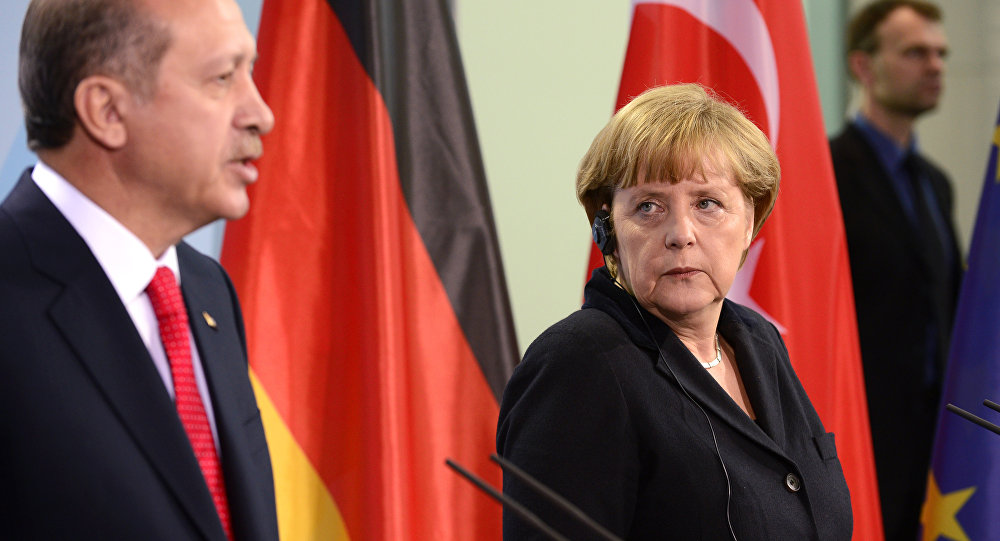
ERDOGAN’S ENEMIES
German journalist faces hearing in Turkey as relations worsen

Mesale Tolu Corlu is set to have her review hearing today, ahead of an October criminal trial on terror-related charges. She could face up to 15 years in prison.
Ms Corlu’s trial marks only one issue dividing Turkey and Germany. Ahead of April’s constitutional referendum, Recep Tayyip Erdogan lashed out at Berlin for blocking Turkish officials from campaigning among Turkish nationals in Germany. At a campaign stop ahead of a September general election, Angela Merkel condemned Turkey’s arrest of a German writer in Spain.
In payback over the referendum slight, Erdogan has declared that ethnically Turkish Germans, about 1 million of whom can vote, should not support Merkel’s Christian Democrats, the centre-left Social Democrats or the environmentalist Greens. He called those parties “enemies of Turkey” and labelled Turkish-descended Green co-leader Cem Ozdemir a “so-called Turk”.
Though cooperation on issues like migrants will continue, expect bad blood between officials to grow. While Erdogan’s electoral appeal could see some ethnic Turks go against mainstream parties, it will do little to harm Merkel’s chances of victory. The leaders’ relationship, however, will be far from unscathed.
KORUS OF DEBATE
US seeks renegotiation of South Korean trade deal

Trade representatives will meet today to discuss renegotiating the US-Korea Free Trade Agreement. KORUS has governed trade between the two since 2012.
In 2016, the US imported $81 billion from South Korea and exported only $63.8 billion. Donald Trump has labelled the $16 billion trade deficit “horrible,” accusing South Korean industry of exploiting regulations to supplant American production of products like cars with their own.
With the success of its continually growing technology sector, South Korean exports have defied global protectionist policies by rising for nine months straight—including at a six-year high of 24.2% in April. The network of large South Korean conglomerates known as chaebols, including Samsung and Hyundai, are intimately linked to the governing apparatus, which would likely go to great lengths to defend them.
While Trump has promised to reduce the total trade deficit, most likely by seeking protections for American automakers, experts argue a renegotiated KORUS won’t bring jobs back to America. South Korea, for its part, has “not agreed on renegotiation of the deal”, and will defend the benefit of free trade to US industry.
TEHRAN’S FINANCIAL WOES
Iran releases inflation numbers as banking crisis looms

Iran is set to release July’s inflation figures today. The change from June’s 11% rate will be a key indicator for the Islamic Republic’s economy.
Having just launched his second term, one of President Hassan Rouhani’s top challenges will be reforming Iran’s banks. Though many financial sanctions were lifted following the 2015 nuclear agreement, many banks must still change their rules to comply with international standards, slowing the Islamic Republic’s integration into the global financial system.
Beyond that, the banking sector is threatened by risky loans that were made under Mahmoud Ahmadinejad, Mr Rouhani’s predecessor from 2005-2013. A total of $346 billion is owed from loans, with some banks having non-performing loan rates as high as 40%. If that rate is not tamped down, it could force banks into bankruptcy and potentially force government bailouts to salvage the economy.
Expect inflation rates to see only a small change, fitting with the government’s target. A big swing in either direction would add another complication to Tehran’s banking woes.
HAPPENING ELSEWHERE…
Syrian rebel talks, Indian bankers strike, Brazil’s political reform

Syria’s opposition High Negotiations Committee will meet with smaller Egyptian- and Russian-backed groups in Riyadh in a bid to hammer out a unified agenda ahead of next month’s UN-mediated talks in Geneva. Reports suggest the delegates will discuss a proposed five-person presidential council composed of two vice presidents appointed by Bashar al-Assad and two from the opposition, with a fifth being independent. Such a body would allow Mr Assad to stay in power during a transition period—something that has been rejected by opposition groups in the past but after the regime’s significant battlefield victories looks increasingly likely.
One million Indian bank employees will hold a nationwide strike today to protest plans to privatise some 20 publicly held financial institutions.
After a delay, Brazilian lawmakers are expected to vote on a package of political reforms.

